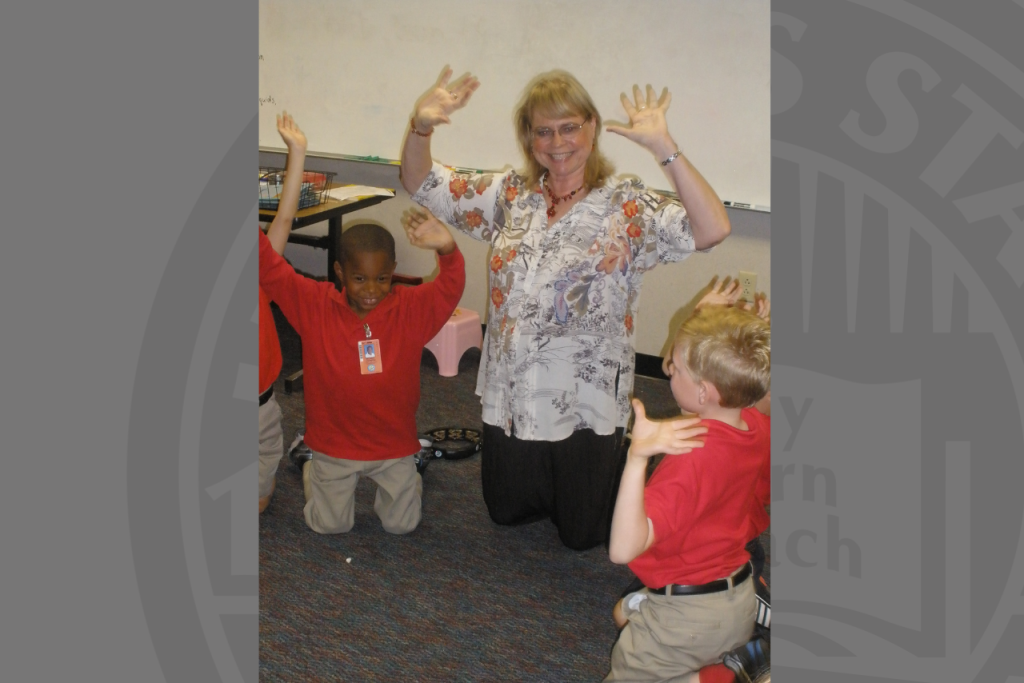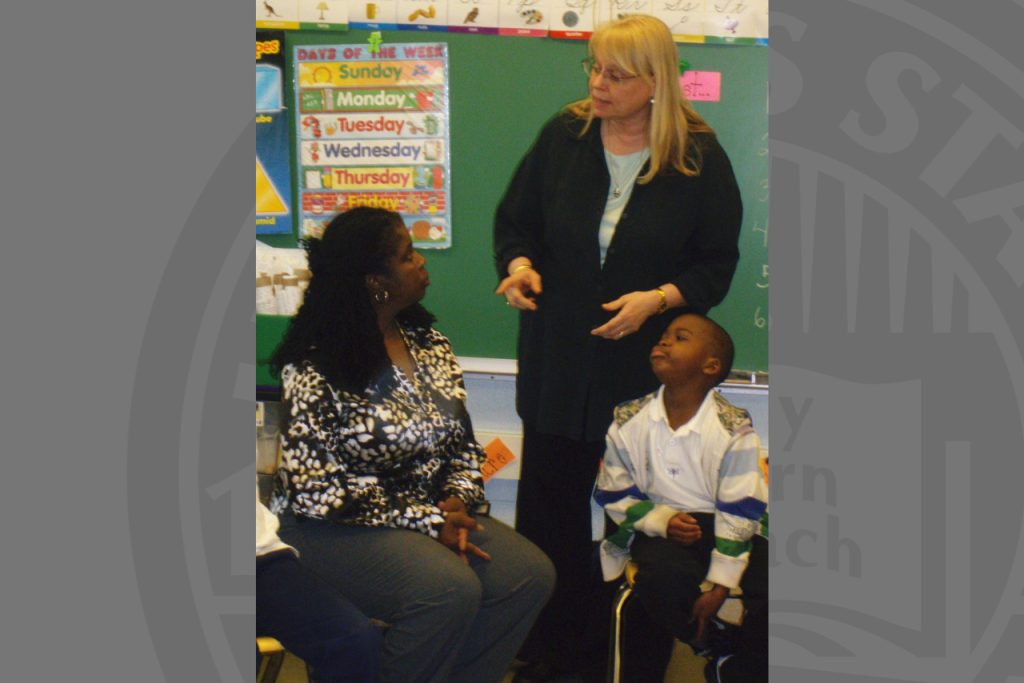When Karen L. Erickson ’70, M.S. ’77, received a tuition-covered scholarship to Illinois State University during her senior year of high school, it came with the stipulation that she had to teach for at least three years following graduation. Although her first desire and passion were not teaching, she would soon find herself making a lifelong career and an innovative impact in the world of education.
Erickson’s father was a teacher, and he encouraged both her and her four siblings to consider becoming teachers as well. However, Erickson did not think this was a career she wanted to pursue since from the age of 8 she knew she wanted to act, direct, and produce. Nonetheless, this familial encouragement led her to become president of the Future Teachers Club during her senior year of high school. At the time, the country was in the midst of a national teacher shortage, and Erickson knew she could not pass up the opportunity to attend college tuition-free.
As a student at Illinois State, Erickson majored in speech communication, but her real passion was in theater, a department that did not yet exist at Illinois State. To get some experience, Erickson had it as the emphasis of her degree, as well as an English minor. After graduating, Erickson began to utilize what she learned at Illinois State in her own teachings.
“I went into teaching, and I was able to bring almost everything I learned at ISU into my classroom. In my early years, I taught Creative Speaking (a public speaking class) and English, and in these classes, I experimented with integrating creative drama,” said Erickson. “Also at the school I taught, there was no existing theater program before I arrived, and I was able to build this expansive theater program with many of my students going into professional theater.”
Although she did not want to teach at first, Erickson soon discovered a love for educating young people, and after teaching for seven years, she took a sabbatical and returned to Illinois State to pursue her master’s degree. By this time, the School of Theatre and Dance was established, and Erickson was able to complete her graduate studies in her true passion. While studying under the faculty in this new department, Erickson became very interested in creative drama and drama education along with directing and producing professional theater.
“One of my dreams as a graduate student was … I got this notion that I wanted to go out and change education for every student in the United States,” said Erickson.

When she returned to the classroom after receiving her master’s, Erickson started to do just that. She spoke about how she integrated drama into the English classroom, while also helping teachers of other subjects, such as history, special education, and home economics, integrate drama into their curriculum. However, when Erickson was offered the opportunity to take leave and assist American playwright Tennessee Williams, most known for A Streetcar Named Desire and Cat on a Hot Tin Roof, at the Goodman Theatre in Chicago, she knew this was an opportunity she could not pass up.
While assisting Williams in directing at Goodman, Erickson also began working at Trinity Square Ensemble Theatre, where she became artistic/producing director for the next 10 years. However, Erickson could not leave teaching behind, as she put her professional skills in the arts to further use by teaching kids during the day.
“As an artist, you end up doing so many odd jobs, like temp work or restaurant work. I thought, ‘Why not take that talent and go in and work in the classroom as a teaching artist?’” asked Erickson.
Her prior experience as a teacher made Erickson well-equipped for the job, and soon, people began to take notice of her expert skills and innovative work bringing drama into the classroom. As word got around, Erickson soon found herself working for the Illinois Arts Council and Urban Gateways, and helping write national and state standards and assessments. In these positions, Erickson was able to travel around the state of Illinois assisting teachers in learning how to incorporate drama into their teaching.
“Drama is the missing link in teaching literacy and getting students to understand and enjoy reading, writing, speaking, and listening. We don’t even touch artistic subjects in most schools, and I knew right away that students’ test scores would go up when drama and other art forms were integrated with reading, math, science, and history.”
During one of these presentations, unbeknown to Erickson, there was an administrator from the John F. Kennedy Center sitting in the audience. After participating in her session, the Kennedy Center representative approached Erickson about developing curriculum to train educators at their more than 120 sites across the country. Before she knew it, Erickson was a National Workshop leader for the Kennedy Center’s Education Program flying out several times a week to help teachers discover how drama could be incorporated into their lesson plans.
“It was because of the melding of my two careers that this opportunity came into my life,” said Erickson. “When I was teaching students, I would call upon my playwriting skills so that when introducing an acting skill like transformation I would quickly devise a story that connected with science content, like the transformation of the butterfly, for students to enact. In this way, I connected my worlds and students learned about both theater and scientific processes simultaneously.”
As Erickson continued to train educators around the country, she was approached by her peers who were looking for more permanent materials to continue following her teachings after she had left. It was clear there was only one thing for her to do, put her work into writing. Erickson began writing books for grades K-5 on how to integrate drama into different subjects in the classroom.
Nine books later and with more than 50,000 books sold, Erickson decided that she was going to retire and quit publishing her books. When a close family member heard this news, they knew Erickson’s work was too important to the world of education to no longer be available for educators and their students. To prevent this loss for the education community, OneStopDRAMAShop.com was born.
OneStopDRAMAShop.com is a website devoted to helping educators across the world find ways to add drama into their everyday lesson plans. Educators can subscribe to a membership to receive online access to hundreds of lesson plan materials and curricula for kindergarten through fifth grade. These materials include lessons, stories, activities, poetry, books, and more all written and created by Erickson.
“There are different languages that people speak, and one of them is the arts. There’s the language of movement, sound, and this, the dramatic language,” said Erickson. “When we keep the arts merely as drop-off programs, which are important for teaching each discipline independently, we miss out on an even deeper impact the arts can have. I think that students benefit when the arts are used not just as an instructional strategy, or art for art’s sake, but when they are also authentically integrated into the teaching of other subjects.”
Because of Erickson’s past experiences at the state and national level, the curriculum on OneStopDRAMAShop.com is up to date to meet standards in the arts. Although right now the curriculum available is only for kindergarten through fifth grade, Erickson is working on expanding the lessons to accommodate students in grades six to eight after receiving requests from junior high educators. She is hoping that by next summer they will have sixth and seventh grade materials available for subscribers. In addition to lessons on typical education subjects, there are also resources for teachers on how to use drama to deal with social-emotional topics, such as bullying in the classroom.
“It’s really almost like a legacy to see all this material go up on the site. We have hundreds and hundreds of lessons that are up and will go up,” said Erickson. “I created a sequential program to eliminate bullying in the classroom. It allows kids to view bullying behaviors from outside themselves. Through drama they can play the bystander, the bully, the target. They can use dramatic character, conversations, movements and materials to react a bullying situation from a safe place.”
Erickson continues to work to add to the site to help OneStopDRAMAShop.com become the true one-stop destination for educators looking to bring dramatic elements and the arts into their academic lessons. As OneStopDRAMAShop.com and Erickson’s lessons continue to grow, so will her impact on the world of education, which has only continued to expand since her time at Illinois State.
“There was a really solid foundation that came out of ISU,” said Erickson. “The variety and quality of teachers available to us and being able to get that kind of an education is important. I grew here as an educator, artist, and humanist. What I give to others began here.”







